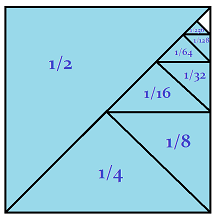Sum One
Algebra
Level
2
What does this picture best illustrate?

n
=
0
∏
∞
2
n
1
=
1
n
=
1
∑
∞
2
n
1
=
1
n
=
1
∑
∞
n
2
1
=
1
n
=
0
∑
∞
2
n
1
=
1
n
=
0
∑
∞
n
2
1
=
1
n
=
1
∏
∞
2
n
1
=
1
n
=
1
∏
∞
n
2
1
=
1
n
=
0
∏
∞
n
2
1
=
1
This section requires Javascript.
You are seeing this because something didn't load right. We suggest you, (a) try
refreshing the page, (b) enabling javascript if it is disabled on your browser and,
finally, (c)
loading the
non-javascript version of this page
. We're sorry about the hassle.
The picture shows that if you keep dividing the remaining area in half, and adding it to the previous total you eventually (at ∞ ) get unity represented by the complete square, or n = 1 ∑ ∞ 2 n 1 = 1